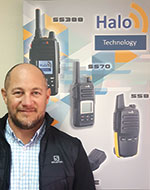
Halo Technology was started in 2010 by managing director Deon Swanepoel, who had previously worked for roughly 20 years at the company which was exclusively distributing Kenwood two-way radio products in Africa. Having served as the export manager for Kenwood and built up a very good working relationship with many of Africa’s countries, he decided to go it alone and Halo Technology was born.

“In the early days, two-way radios used crystal technology with a push-to-talk (PTT) and a release-to-listen button. Since the advent of digital technology, the world of communication has been turned upside down,” says Halo Technology’s Tony Lohrentz. “With the new digital format, radios have redefined the mobile two-way radio communication by now offering you communication anywhere, over any distance via the GSM network (provided cellphone coverage is available) – this is known as HALO PTT.”
The company prides itself on the digital networks it has supplied in vast quantities to the mining industry, locally as well as into Africa. Lohrentz says the two systems that stand head-and-shoulder above the rest are the Kenwood NEXEDGE and Motorola TRBOnet systems. The current generation of digital two-way radios are feature-rich tools that increase safety and enhance productivity. Digital voice quality is greatly enhanced, and with integrated GPS technology, control rooms can now track radio users as well as other assets for efficient and effective deployment of the closest resources to an event.
Digital two-way radios can be used for time-and-attendance (T&A) due to the fact that when the security guard switches on his radio, he will automatically be registered as being on duty, and when he switches the radio off, the radio will register him as being off duty. Furthermore, the digital quality of speech patterns increases the distance possible between two radios, whereas analogue speech quickly deteriorates with increasing distance.
In spite of the digital advantages, there are a number of commercial people as well as companies still using analogue radios, Lohrentz points out. In most instances this can be attributed to budgetary restraints. In order to assists these people, digital technology now allows a radio to operate either in analogue mode or in digital mode, giving two-way radio users the opportunity to slowly convert to the digital format over a period of time.
The narrow band traditionally associated with analogue radios means users are limited to how much data they can push through. With the evolution of digital radios, one is provided with access to high-speed data transmission and with the advent of IP technology, users are now able to leverage larger networks.
One of Halo Technology’s market strengths today is the introduction of HALO PTT radios. This top-of-the-range equipment boasts GPS live tracking, voice recordings, stun and revive, geo-fencing, group call as well as individual call functionality for a very cost-effective price. Software linked to a computer or laptop allows the user to manage their entire network from anywhere in the world – Internet connectivity is therefore critical.
“There is no doubt that the latest digital two-way radio technology has elevated the popular walkie-talkie to the realm of advanced security tool. With a plethora of features and functionality, the security industries, estates, transport and commercial markets are spoilt for choice. In spite of the increasing use of mobile cellular technology, the digital two-way radio is here to stay for the foreseeable future. As technology continues to advance, these radios will continue to provide a fast and efficient way of communicating on any platform.
“Halo Technology is focused on supplying South Africa and many African countries with affordable and cost-effective two-way radio communication. With our expertise in this field, we believe that we are one step ahead of our competition, by being a one-stop shop. Our strengths lie not only in our sales and service, but especially in our after-sales service which is extremely critical today,” says Lohrentz.
For more information contact Halo Technology, +27 12 347 1430, [email protected], www.halotechnology.co.za
© Technews Publishing (Pty) Ltd. | All Rights Reserved.